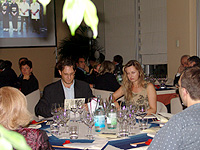| My thought to this diner
Part.2
Text & Photo by Kunio TOKUOKA
How did you like our diner and Matcha at the end? Matcha have
always been a significant role to play as Eastern and Western
cultural bridges and human culture beyond the border.
It preaches no religious doctrine. Its great strength lies in
the concreteness of its forms and its foundation in the most
fundamental of human activities: sitting together with others,
partaking of a meal, and drinking tea.
Sen Rikyu (1522-1591), the man who established the foundations
of chano-yu as we know it today, said: "Shano-yu is just
a matter of boiling water, and drinking tea; nothing else is
involved."
One of the most revealing expressions of the quality of respect
in chano-yu is the phrase, "this meeting-but once in a
lifetime"(ichigo ichie). These words define the attitude
of the practitioner during a tea gathering, and are derived
from the instruction of Jo'o, Rikyu's teacher:
From the moment you enter the garden pathway until the time
you depart, you
Should hold the host in most respectful esteem, in the spirit
that the gathering will
occur but once in your life.
 |
This attitude of cherishing each moment is nurtured through
training in chano-yu, and has value to all human encounters.
When the tea student receives instruction from a teacher-or
when we meet our associates, our friend, our family-this sense
of the significance of the present is the manifestation of
sincerity. In chano-yu, sincerity extends as well to one's
hands comes to exist as more than the name of a kiln, the
"one and only time," when the pressures of our won
self-centered lives are forgotten at the moment of drinking
from it.
"Ichigo ichie", the same is true in the culinary
world. The cuisine is a close encounter of another kind; love
food the instant in a mouthful, acquire taste, impressive
taste and ceremony, unique flavor, weariless taste and so
on... I think it's a kind of combination of "ichigo ichie"
that are in the gastronomic culture happening. We have many
different varieties of meetings throughout a lifetime, but
no two are ever the same. Same place, same time, same meeting,
same taste... It'll never happen again. Therefore we open
to meeting new people and enjoy the current moment.
In addition, it brings an encounter with people and our history
through various meetings. And it could be that there are also
the encounter with the author who made the history at ancient
times and the encounter with most-beloved something and historical
object dating back to the olden times. This nature, essence,
preciousness of "ichigo ichie" comes from the dignity
of those values.
I hope to cherish every moment spent with all of you, today,
and I shall always remember you out there as one of our greatest
guests. And with today's dinner as start, I'll be grateful
if we can more unite as one people who have same philosophy
beyond the place, history and culture. At the same time, it's
my sincere wish that none of you will ever forget this day.
We expect to meet again in the near future.
NOTE
◆ “ichigo ichie” is used commonly in referring to "Treasure
every encounter with others, because you never know if you'll
meet a person just once in your lifetime". I quoted a
passage from a poem by Robert Browning in its title.
◆ “The Book of Tea” Okakura Tenshin, Soshitsu Sen XV and Akira
Asano, 1998

|

